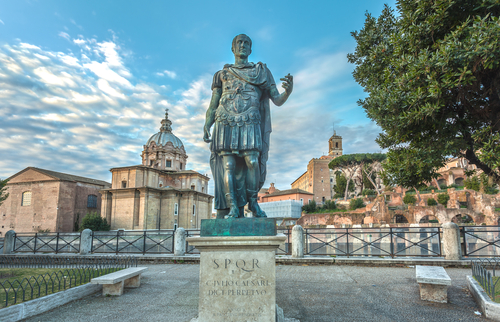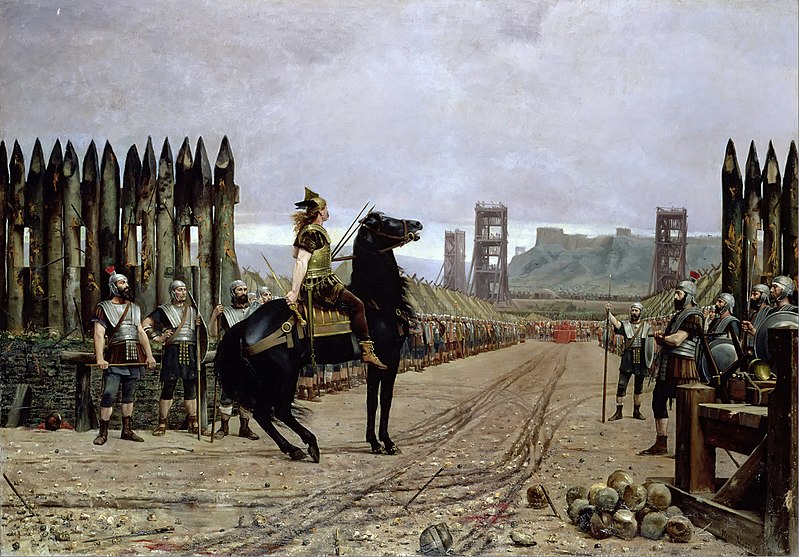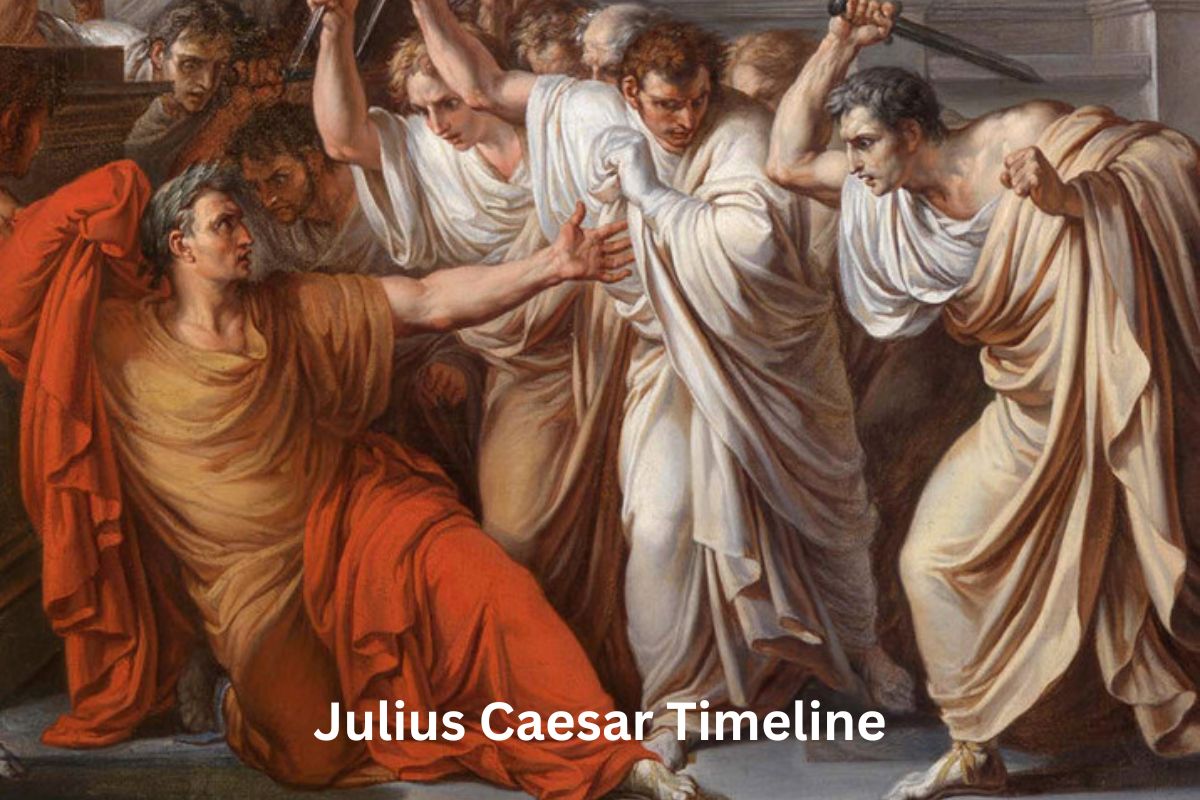Julius Caesar was a prominent Roman statesman, military general, and influential figure in ancient history.
Born in 100 BCE into a patrician family, Caesar’s ambition and intelligence propelled him to become one of the most powerful individuals in Rome.
Throughout his life, he achieved military victories, enacted political reforms, and eventually met a tragic end through assassination.
His conquests, political maneuvers, and the impact of his rule had a profound and lasting influence on the Roman Republic, setting the stage for the transition to the Roman Empire.
Julius Caesar’s life and legacy continue to fascinate and shape our understanding of ancient Rome.
| Year | Event |
|---|---|
| 100 BCE | Julius Caesar is born on July 12th in Rome |
| 84 BCE | Caesar’s father, Gaius Caesar, dies |
| 82 BCE | Caesar marries Cornelia |
| 81 BCE | Caesar divorces Cornelia |
| 80 BCE | Caesar leaves Rome to avoid persecution |
| 78 BCE | Caesar serves in the military in Asia Minor and Cilicia |
| 73 BCE | Caesar is elected military tribune and fights against pirates |
| 69 BCE | Caesar is elected quaestor and travels to Spain |
| 65 BCE | Caesar is elected curule aedile |
| 63 BCE | Caesar is elected pontifex maximus |
| 60 BCE | Caesar forms the First Triumvirate with Pompey and Crassus |
| 59 BCE | Caesar is elected consul and enacts reforms |
| 58-50 BCE | Caesar leads military campaigns in Gaul |
| 49 BCE | Caesar crosses the Rubicon and triggers civil war |
| 48 BCE | Caesar defeats Pompey’s forces at the Battle of Pharsalus |
| 46 BCE | Caesar is appointed dictator for ten years |
| 45 BCE | Caesar is appointed dictator for life |
| 44 BCE | Julius Caesar is assassinated on March 15th |
| 44-43 BCE | The Second Triumvirate is formed |
| 42 BCE | The forces of the Second Triumvirate defeat the assassins at Philippi |
| 27 BCE | Octavian becomes the first Roman Emperor, Augustus |
Timeline of Julius Caesar
100 BCE – Julius Caesar is born on July 12th in Rome
Julius Caesar was born into a patrician family, which belonged to the Roman aristocracy. His family claimed descent from the legendary Trojan prince Aeneas and the goddess Venus.
Caesar’s father, Gaius Caesar, held important political positions and served as a praetor and a governor in Asia.
From an early age, Caesar showed great intelligence and ambition, setting the stage for his future rise to power.

84 BCE – Caesar’s father, Gaius Caesar dies
The death of Caesar’s father had a profound impact on his life. At the age of 16, he became the head of the family and inherited the responsibility of upholding his family’s prestige and political influence.
Following his father’s death, Caesar faced challenges and obstacles in the politically turbulent environment of Rome, especially under the dictatorship of Sulla.
82 BCE – Caesar marries Cornelia
Despite opposition from the ruling faction led by Sulla, Caesar married Cornelia, the daughter of a prominent senator named Lucius Cornelius Cinna.
This marriage alliance brought Caesar into contact with influential political circles and demonstrated his willingness to challenge the status quo.
81 BCE – Caesar divorces Cornelia
Caesar’s marriage to Cornelia stirred controversy and incurred the displeasure of Sulla, who demanded that he divorce her.
However, Caesar refused to comply with Sulla’s orders, even at great personal risk, as divorce was considered a dishonorable act in Roman society. This decision showcased his determination and independence of spirit.
80 BCE – Caesar leaves Rome to avoid persecution
Faced with the increasing threat to his life from Sulla’s regime, Caesar made the decision to leave Rome and travel to the eastern part of the Roman Empire.
During his time away from Rome, Caesar served in the military and gained valuable experience that would shape his future as a skilled commander and strategist.
His departure from Rome allowed him to evade Sulla’s persecution and survive a period of political upheaval, setting the stage for his eventual return and rise to power.
78 BCE – Caesar serves in the military in Asia Minor and Cilicia
During this period, Caesar served as a military officer in Asia Minor (present-day Turkey) and Cilicia (southeastern Anatolia).
His service in these regions provided him with valuable firsthand experience in warfare and leadership, honing his skills as a commander.
73 BCE – Caesar is elected military tribune and fights against pirates
Julius Caesar was elected as a military tribune, a position that allowed him to command troops and gain further military experience.
One notable campaign during this time was his involvement in suppressing the rampant piracy that plagued the Mediterranean Sea. Caesar played a crucial role in combating these pirates and restoring security to the region.

69 BCE – Caesar is elected quaestor and travels to Spain
Caesar’s political career advanced as he was elected as a quaestor, a role responsible for financial administration and assisting higher-ranking officials.
He was assigned to the province of Hispania Ulterior (Further Spain) and gained military and administrative experience during his time there.
65 BCE – Caesar is elected curule aedile
As curule aedile, Caesar was responsible for organizing public games, festivals, and other spectacles in Rome.
He used his personal wealth and resources to put on extravagant shows, earning him popularity among the Roman citizens and further enhancing his political standing.
63 BCE – Caesar is elected pontifex maximus
Julius Caesar was elected to the prestigious position of pontifex maximus, the chief priest of Rome.
This influential religious office brought him closer to the political and social elite of Rome and increased his status as a prominent figure in Roman society.
60 BCE – Caesar forms the First Triumvirate with Pompey and Crassus
Recognizing the importance of political alliances, Caesar formed a powerful coalition known as the First Triumvirate.
The alliance consisted of Caesar, Pompey (a renowned military general), and Crassus (a wealthy Roman politician).
This political partnership allowed the three men to consolidate their influence and dominate Roman politics, with Caesar using it as a stepping stone to further his own ambitions.
59 BCE – Caesar is elected consul and enacts reforms
Julius Caesar was elected as one of the two consuls of Rome, the highest elected office in the Republic.
As consul, Caesar implemented various reforms aimed at improving the lives of the common people, such as land redistribution and the creation of public works projects.
His policies endeared him to the plebeians and earned him their support and loyalty.

58-50 BCE – Caesar leads military campaigns in Gaul
One of the most significant chapters of Caesar’s life was his conquest of Gaul (modern-day France) during a series of military campaigns known as the Gallic Wars.
From 58 BCE to 50 BCE, Caesar led Roman legions in subduing Gallic tribes, expanding Roman control and influence over the region.
His military successes and strategic brilliance solidified his reputation as a skilled general and earned him immense popularity among his troops.
49 BCE – Caesar crosses the Rubicon and triggers a civil war
Facing resistance from the conservative Roman Senate and fearing prosecution, Caesar made the daring decision to cross the Rubicon River with his army, defying the Senate’s orders to disband his forces.
This act marked the beginning of a civil war between Caesar and his supporters, known as the Populares, and the senatorial faction led by Pompey.
The phrase “crossing the Rubicon” has since become a metaphor for taking a decisive and irreversible step.
48 BCE – Caesar defeats Pompey’s forces at the Battle of Pharsalus
In a pivotal battle in Greece, Caesar’s forces decisively defeated the armies of Pompey, his former ally turned rival.
The Battle of Pharsalus solidified Caesar’s military dominance and secured his position as the de facto ruler of Rome.
46 BCE – Caesar is appointed dictator for ten years, and later dictatorfor life
In the aftermath of his victory, Caesar was appointed dictator, a temporary position of supreme power, for a period of ten years.
Later, in 45 BCE, he was appointed dictator for life, effectively establishing himself as the unrivaled ruler of Rome.
These appointments, while consolidating power in Caesar’s hands, also drew criticism and fueled fears of his potential tyranny among the senatorial class.
44 BCE – Julius Caesar is assassinated on March 15th
On the Ides of March (March 15th), Julius Caesar was assassinated in a conspiracy led by a group of senators, including Marcus Junius Brutus and Gaius Cassius Longinus.
The assassination was fueled by fears of Caesar’s growing power and concerns over the erosion of the Roman Republic’s institutions.
His death sent shockwaves through Rome, leading to political instability and ultimately sparking a new phase of civil war.

44-43 BCE: The Second Triumvirate is formed
Following Caesar’s assassination, a power struggle ensued among his loyalists, conspirators, and other prominent figures in Rome.
Eventually, three key figures emerged: Octavian (Caesar’s nephew and adopted heir), Mark Antony (a trusted general of Caesar), and Lepidus (a Roman politician).
In 43 BCE, they formed the Second Triumvirate, a political alliance aimed at avenging Caesar’s death and maintaining control of Rome.
42 BCE: The forces of the Second Triumvirate defeat the assassins at Philippi
The Second Triumvirate faced military opposition from the assassins of Julius Caesar, led by Brutus and Cassius.
In 42 BCE, the two sides clashed in the Battle of Philippi in Greece. The forces of the Second Triumvirate emerged victorious, securing their authority and eliminating their rivals.
27 BCE Octavian becomes the first Roman Emperor, Augustus
Octavian, also known as Gaius Octavius, emerged as the dominant figure within the Second Triumvirate after the defeat of his rivals.
In 27 BCE, the Senate granted Octavian the title “Augustus,” marking the beginning of his reign as the first Roman Emperor and the establishment of the Roman Empire.
Augustus’s rule marked a significant shift from the Roman Republic to a centralized imperial government, leading to an era of relative stability and prosperity known as the Pax Romana (Roman Peace).
Julius Caesar’s legacy
Julius Caesar’s life and death had a profound and lasting impact on Roman history.
He is remembered as one of the most influential figures in the rise of the Roman Empire and the transformation of Rome’s political system.
His military campaigns expanded Roman territory, while his political reforms and centralization of power laid the foundations for the imperial era.
Additionally, his assassination became a symbol of political treachery and power struggles within the Roman elite.
